ReadWriteThink
Read Write Think: Talking About Books to Improve Comprehension
This lesson is a conversation-starter! In this lesson, students learn about striking up deep-thought conversations and staying on topic in the form of a book talk.
Other
Literature Circles Resource Center: Teaching Students How to Discuss
Teachers are given strategies and hands-on approaches to help students prepare for a discussion and participate as active members of it.
Sophia Learning
Sophia: Asking Clarifying Questions: Lesson 2
At the end of this tutorial, the learner will be able to ask appropriate and effective questions to better understand a communication or situation. It is 2 of 3 in the series titled "Asking Clarifying Questions."
Other
Youth Learn: The Key to Engaging Students in Learning: Asking Good Questions
Explanation of several types of questions, and suggestions for helping students use good questioning techniques in inquiry-based learning. SL.9-10.1c Active Partic
Read Works
Read Works: How to Say What You're Really Feeling
[Free Registration/Login Required] An informational text about sharing your feelings and listening when others share theirs. A question sheet is available to help students build skills in reading comprehension.
Other
Thinkport.org: Monitor Comprehension
A resourceful site explaining, chronicling, and detailing the idea of students' monitoring their own comprehension of a task or understanding. Includes a video link, quotes from experts, links, and more.
Sophia Learning
Sophia: Following Directions: Tutorial
In this slideshow tutorial, students will review basics regarding the following of directions on an assessment and/or reading comprehension test. Strategies related to looking for particular words and phrases in a testing situation are...
Sophia Learning
Sophia: Incorporating Quotes in Your Writing
Notes, a fourteen-slide presentation, and two videos teaching students how to incorporate and punctuate quotes into various sections of an essay and how to embed quotes within a paragraph.
FNO Press
From Now On: A Questioning Toolkit
What exactly is a "questioning tool kit"? This resource provides techniques for asking essential questions, hypothetical questions, telling questions, planning questions and organizing questions.
Curated OER
Mc Graw Hill: Part 2: Reading Informational Text: Ask and Answer Questions
Learn about questions to ask while reading a text on this site. Also, review where to look for the answers to the questions that you asked.
Wisc-Online
Wisc Online: Concluding Your Speech
The conclusion of a speech is your last chance to stress your main idea and purpose. How can you make it memorable? Follow these guidelines to write a strong conclusion to a speech.
Other
Storytelling to Assess Speaking and Listening
An effective use of rubrics that encourages the student storyteller how to determine if his/her audience is listening. Learn about the different listening skill rubrics, storytelling rubrics and a self-assessment guide that asks the...
Utah Education Network
Uen: Facs: Communication
This lesson plan is to help learners identify good listening and talking skills. The different kinds of communication are verbal, written, and non-verbal. Included in this lesson are activities for each type of communication.
CommonLit
Common Lit: Eating in Silence
A learning module that begins with "Eating in Silence" by Pamela Huber, accompanied by guided reading questions, assessment questions, and discussion questions. The text can be printed as a PDF or assigned online through free teacher and...
Wisc-Online
Wisc Online: How to Listen Better
Students read a description of what it means to listen respectively. Then they write a brief action plan for becoming a better listener.
Quizlet
Quizlet: Elements of an Argument Flashcards
Argument essay terms are included in this review exercise. Interactive vocabulary flashcards are provided for the following words: argument, claim, support, reasons, evidence, and counterargument.
Better Lesson
Better Lesson: What the Heck Is That? Inferring the Purpose of an Object
In this lesson, 5th graders use their prior knowledge and inference skills to determine uses of unfamiliar objects. They participate in group discussions and analyze the key information they have in order to reach conclusions.
McGraw Hill
Mc Graw Hill: Speaking and Listening: Respond to Ideas and Questions
Excellent guidelines for how to ask and answer questions in order to have a productive group discussion.
BBC
Bbc Bitesize: Listening to Others and Building on Arguments
This resource explains how to listen carefully to someone to identify the points they are trying to make and how to use those points to add additional information to the discussion. Includes sentence starters to help frame what you want...
Other
New South Wales Educational Resources: Talking and Listening in K 6
Lists developmental characteristics of speech and listening of K-6 children. Excellent educational site from New South Wales.
Florida Center for Reading Research
Florida Center for Reading Research: Answer Know How [Pdf]
A lesson plan in which students sort questions into one of four types: On My Own, Author and Me, Right There, and Think and Search. Materials are included.
Other
Medium: Helping Students Ask Better Questions by Creating a Culture of Inquiry
We want to see kids asking tons of questions. This is how students grow into creative, critical thinkers. This article by John Spencer gives multiple ways teachers can foster an environment in which students feel comfortable asking...
Edutopia
Edutopia: Teaching Students How to Ask Productive Questions
This article gives insight into how to improve engagement, comprehension, and critical thinking by teaching students the process of asking insightful questions. Included is a comprehensive, metacognitive framework of questioning skills...
Love To Know Media
Your Dictionary: Examples of Open Ended and Closed Ended Questions
Explains the difference between open and closed questions. Gives examples and situations where each might be used.






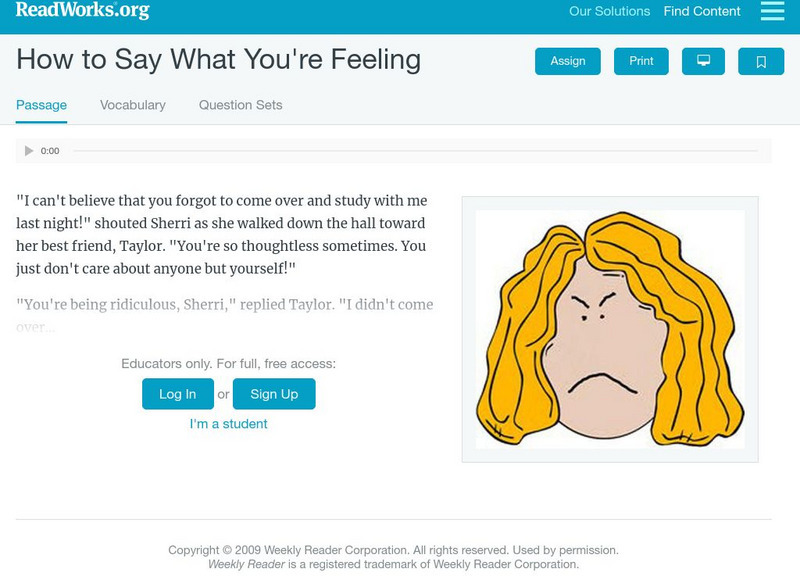

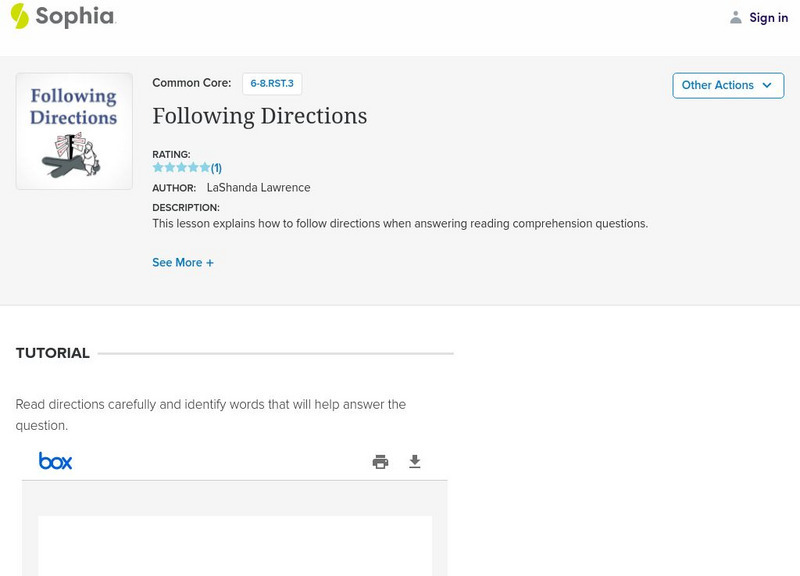
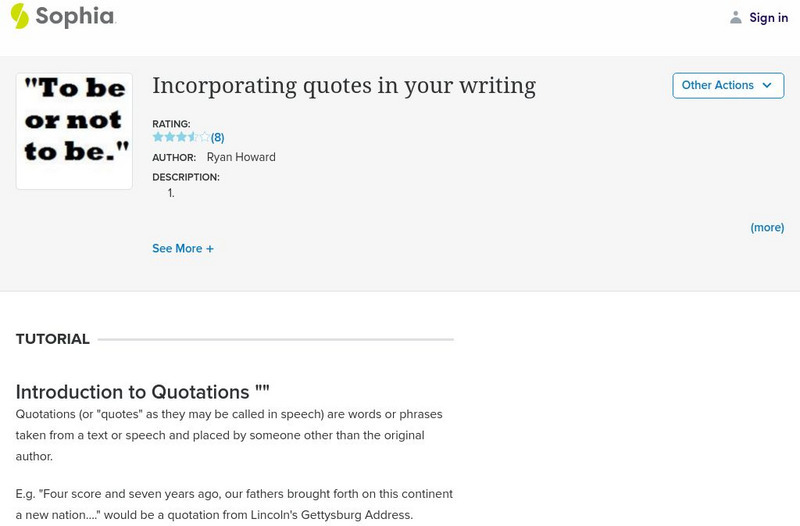
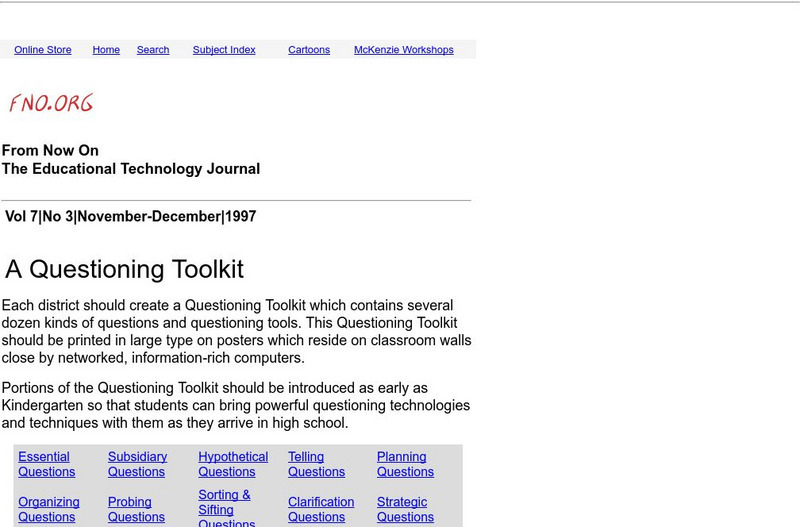



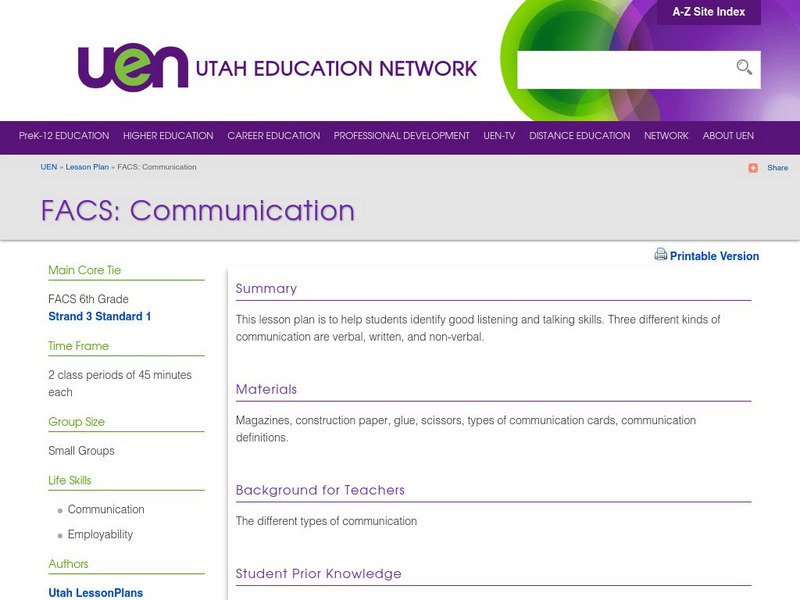

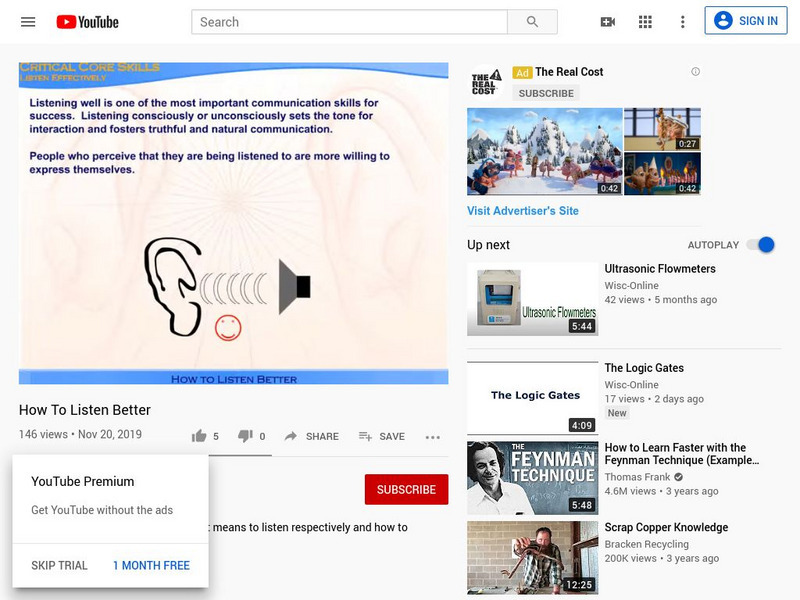




![Florida Center for Reading Research: Answer Know How [Pdf] Lesson Plan Florida Center for Reading Research: Answer Know How [Pdf] Lesson Plan](https://content.lessonplanet.com/knovation/original/509081-6c393dbd829b817b3ebc88945d0d476c.jpg?1661787001)
